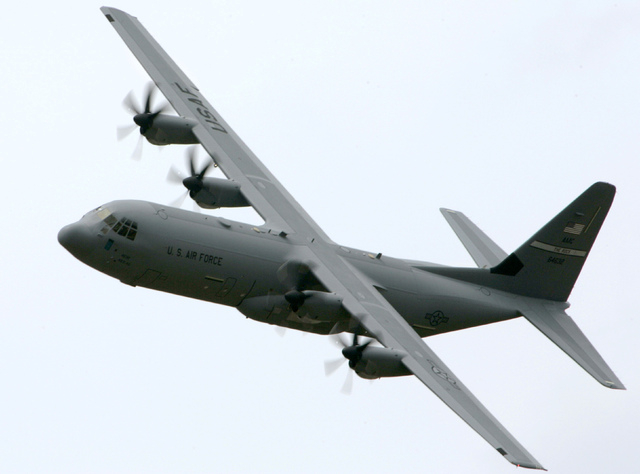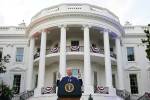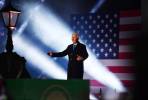U.S. launches more attacks against militants in Iraq
WASHINGTON — The U.S. launched two more airstrikes against Islamic State targets in northern Iraq on Friday, hitting a vehicle convoy and two mortar positions, the Pentagon said.
The attacks near the city of Irbil were carried out by armed drones and Navy fighter jets, said the Defense Department’s press secretary, Navy Rear Adm. John Kirby.
The drone struck a mortar position, and when Islamic State fighters returned to the site moments later they were attacked again and killed, Kirby said.
Separately, four Navy F/A-18 fighter jets struck a stationary convoy of seven vehicles and a mortar position outside Irbil, he said. The jets flew off the USS George HW Bush aircraft carrier and dropped a total of eight laser-guided bombs.
The Friday strikes followed an air attack earlier in the day on an Islamic State artillery gun that was firing on Kurdish troops near U.S. personnel, officials said. President Barack Obama said late Thursday that the U.S. would launch airstrikes on the militant group that was threatening American military trainers in the northeastern Iraq city.
Speaking to reporters while traveling in India Friday, Defense Secretary Chuck Hagel said the U.S. military has sufficient intelligence resources and assets in place to launch strikes by both manned and unmanned aircraft in the region.
Asked if the Islamic State group could successfully hide among civilians to evade strikes, Hagel said if the Islamic State moves against Irbil, Baghdad or the refugees trapped on a mountain, “it’s pretty clear who they are, and they would be pretty identifiable where our airstrikes could be effective.”
The Yazidis, who follow an ancient religion with ties to Zoroastrianism, fled their homes after the Islamic State group issued an ultimatum to convert to Islam, pay a religious fine, flee their homes or face death.
“Earlier this week, one Iraqi in the area cried to the world, ‘There is no one coming to help.’ Well, today, America is coming to help,” Obama said. “We’re also consulting with other countries — and the United Nations — who have called for action to address this humanitarian crisis.”
The announcement reflected the deepest American engagement in Iraq since U.S. troops left.
Obama, who made his remarks in a steady and somber tone, has staked much of his legacy as president on ending what he once called the “dumb war” in Iraq.
Mindful of the public’s aversion to another lengthy war, Obama acknowledged that the prospect of a new round of U.S. military action would be a cause for concern among many Americans. He vowed anew not to put American combat troops back on the ground in Iraq and said there was no U.S. military solution to the crisis.
“As commander in chief, I will not allow the United States to be dragged into fighting another war in Iraq,” Obama said.
Even so, he outlined a rationale for airstrikes in the event the Islamic State militants advanced on American troops in Irbil and the U.S. consulate there in the Kurdish region of Iraq. The troops were sent to Iraq earlier this year as part of the White House response to the extremist group’s swift movement across the border with Syria and into Iraq.
“When the lives of American citizens are at risk, we will take action,” Obama said. “That’s my responsibility as commander in chief.”
He said he had also authorized the use of targeted military strikes if necessary to help the Iraqi security forces protect civilians.
The Pentagon said the airdrops were performed by one C-17 and two C-130 cargo aircraft that together delivered a total of 72 bundles of food and water. They were escorted by two F/A-18 fighters from an undisclosed air base in the region.
The planes delivered 5,300 gallons of fresh drinking water and 8,000 pre-packaged meals and were over the drop area for less than 15 minutes at a low altitude.
The president cast the mission to assist the Yazidis as part of the American mandate to assist around the world when the U.S. has the unique capabilities to help avert a massacre.
In those cases, Obama said, “we can act carefully and responsibly to prevent a potential act of genocide.”
Officials said the U.S. was prepared to undertake additional humanitarian airdrops if necessary, though they did not say how quickly those missions could occur.
Administration officials had said earlier they believed unilateral U.S. strikes would be consistent with international law, in part because the Iraqi government has asked for Washington to take military action. They also said Obama had the constitutional authority to act on his own in order to protect American citizens.
Obama had similarly authorized strikes in Syria last summer after chemical weapons were deployed, but those attacks were never carried out, in part because of domestic political concerns and also because an international agreement to strip Syria of its stockpiles of the deadly gases.
The president has also faced persistent calls to take military action in Syria on humanitarian grounds, given that more than 170,000 people have been killed there.
Critics, including some Republicans in Congress, have argued that Obama’s cautious approach to Syria has allowed the Islamic State group to flourish there, growing strong enough to move across the border with Iraq and make swift gains.
Republican Sens. John McCain of Arizona and Lindsey Graham of South Carolina praised Obama’s proposed actions Thursday night but said much more will be necessary.
“This should include the provision of military and other assistance to our Kurdish, Iraqi and Syrian partners” who are fighting the militants, airstrikes against the militants’ leaders and forces and support for Sunni Iraqis who seek to resist the extremists, they said in a statement.
In light of the militants’ advances, Obama dispatched about 800 U.S. forces to Iraq earlier this year, with those troops largely split between joint operation centers in Baghdad and Irbil.
More than half are providing security for the embassy and U.S. personnel. American service members also are involved in improving U.S. intelligence, providing security cooperation and conducting assessments of Iraqi capabilities.
Associated Press writers Josh Lederman and Darlene Superville contributed to this report.
Follow Julie Pace at http://twitter.com/jpaceDC and Robert Burns at http://twitter.com/RobertBurnsAP






























